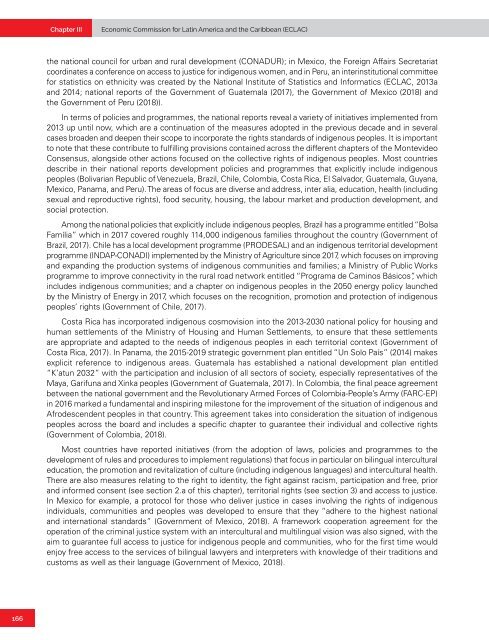Draft first regional report on the implementation of the Montevideo Consensus on Population and Development
This draft report seeks to give an account of progress in the implementation of the priority measures of the Montevideo Consensus on Population and Development in the region, as well as the differences between countries in terms of the degree of implementation. By highlighting relevant national experiences, it also seeks to facilitate the exchange of good practices among countries so that they can benefit from each other in their efforts to advance the implementation of the actions of the Montevideo Consensus.
This draft report seeks to give an account of progress in the implementation of the priority measures of the Montevideo Consensus on Population and Development in the region, as well as the differences between countries in terms of the degree of implementation. By highlighting relevant national experiences, it also seeks to facilitate the exchange of good practices among countries so that they can benefit from each other in their efforts to advance the implementation of the actions of the Montevideo Consensus.
You also want an ePaper? Increase the reach of your titles
YUMPU automatically turns print PDFs into web optimized ePapers that Google loves.
Chapter III<br />
Ec<strong>on</strong>omic Commissi<strong>on</strong> for Latin America <strong>and</strong> <strong>the</strong> Caribbean (ECLAC)<br />
<strong>the</strong> nati<strong>on</strong>al council for urban <strong>and</strong> rural development (CONADUR); in Mexico, <strong>the</strong> Foreign Affairs Secretariat<br />
coordinates a c<strong>on</strong>ference <strong>on</strong> access to justice for indigenous women, <strong>and</strong> in Peru, an interinstituti<strong>on</strong>al committee<br />
for statistics <strong>on</strong> ethnicity was created by <strong>the</strong> Nati<strong>on</strong>al Institute <strong>of</strong> Statistics <strong>and</strong> Informatics (ECLAC, 2013a<br />
<strong>and</strong> 2014; nati<strong>on</strong>al <str<strong>on</strong>g>report</str<strong>on</strong>g>s <strong>of</strong> <strong>the</strong> Government <strong>of</strong> Guatemala (2017), <strong>the</strong> Government <strong>of</strong> Mexico (2018) <strong>and</strong><br />
<strong>the</strong> Government <strong>of</strong> Peru (2018)).<br />
In terms <strong>of</strong> policies <strong>and</strong> programmes, <strong>the</strong> nati<strong>on</strong>al <str<strong>on</strong>g>report</str<strong>on</strong>g>s reveal a variety <strong>of</strong> initiatives implemented from<br />
2013 up until now, which are a c<strong>on</strong>tinuati<strong>on</strong> <strong>of</strong> <strong>the</strong> measures adopted in <strong>the</strong> previous decade <strong>and</strong> in several<br />
cases broaden <strong>and</strong> deepen <strong>the</strong>ir scope to incorporate <strong>the</strong> rights st<strong>and</strong>ards <strong>of</strong> indigenous peoples. It is important<br />
to note that <strong>the</strong>se c<strong>on</strong>tribute to fulfilling provisi<strong>on</strong>s c<strong>on</strong>tained across <strong>the</strong> different chapters <strong>of</strong> <strong>the</strong> M<strong>on</strong>tevideo<br />
C<strong>on</strong>sensus, al<strong>on</strong>gside o<strong>the</strong>r acti<strong>on</strong>s focused <strong>on</strong> <strong>the</strong> collective rights <strong>of</strong> indigenous peoples. Most countries<br />
describe in <strong>the</strong>ir nati<strong>on</strong>al <str<strong>on</strong>g>report</str<strong>on</strong>g>s development policies <strong>and</strong> programmes that explicitly include indigenous<br />
peoples (Bolivarian Republic <strong>of</strong> Venezuela, Brazil, Chile, Colombia, Costa Rica, El Salvador, Guatemala, Guyana,<br />
Mexico, Panama, <strong>and</strong> Peru). The areas <strong>of</strong> focus are diverse <strong>and</strong> address, inter alia, educati<strong>on</strong>, health (including<br />
sexual <strong>and</strong> reproductive rights), food security, housing, <strong>the</strong> labour market <strong>and</strong> producti<strong>on</strong> development, <strong>and</strong><br />
social protecti<strong>on</strong>.<br />
Am<strong>on</strong>g <strong>the</strong> nati<strong>on</strong>al policies that explicitly include indigenous peoples, Brazil has a programme entitled “Bolsa<br />
Família” which in 2017 covered roughly 114,000 indigenous families throughout <strong>the</strong> country (Government <strong>of</strong><br />
Brazil, 2017). Chile has a local development programme (PRODESAL) <strong>and</strong> an indigenous territorial development<br />
programme (INDAP-CONADI) implemented by <strong>the</strong> Ministry <strong>of</strong> Agriculture since 2017, which focuses <strong>on</strong> improving<br />
<strong>and</strong> exp<strong>and</strong>ing <strong>the</strong> producti<strong>on</strong> systems <strong>of</strong> indigenous communities <strong>and</strong> families; a Ministry <strong>of</strong> Public Works<br />
programme to improve c<strong>on</strong>nectivity in <strong>the</strong> rural road network entitled “Programa de Caminos Básicos”, which<br />
includes indigenous communities; <strong>and</strong> a chapter <strong>on</strong> indigenous peoples in <strong>the</strong> 2050 energy policy launched<br />
by <strong>the</strong> Ministry <strong>of</strong> Energy in 2017, which focuses <strong>on</strong> <strong>the</strong> recogniti<strong>on</strong>, promoti<strong>on</strong> <strong>and</strong> protecti<strong>on</strong> <strong>of</strong> indigenous<br />
peoples’ rights (Government <strong>of</strong> Chile, 2017).<br />
Costa Rica has incorporated indigenous cosmovisi<strong>on</strong> into <strong>the</strong> 2013-2030 nati<strong>on</strong>al policy for housing <strong>and</strong><br />
human settlements <strong>of</strong> <strong>the</strong> Ministry <strong>of</strong> Housing <strong>and</strong> Human Settlements, to ensure that <strong>the</strong>se settlements<br />
are appropriate <strong>and</strong> adapted to <strong>the</strong> needs <strong>of</strong> indigenous peoples in each territorial c<strong>on</strong>text (Government <strong>of</strong><br />
Costa Rica, 2017). In Panama, <strong>the</strong> 2015-2019 strategic government plan entitled “Un Solo País” (2014) makes<br />
explicit reference to indigenous areas. Guatemala has established a nati<strong>on</strong>al development plan entitled<br />
“K’atun 2032” with <strong>the</strong> participati<strong>on</strong> <strong>and</strong> inclusi<strong>on</strong> <strong>of</strong> all sectors <strong>of</strong> society, especially representatives <strong>of</strong> <strong>the</strong><br />
Maya, Garifuna <strong>and</strong> Xinka peoples (Government <strong>of</strong> Guatemala, 2017). In Colombia, <strong>the</strong> final peace agreement<br />
between <strong>the</strong> nati<strong>on</strong>al government <strong>and</strong> <strong>the</strong> Revoluti<strong>on</strong>ary Armed Forces <strong>of</strong> Colombia-People’s Army (FARC-EP)<br />
in 2016 marked a fundamental <strong>and</strong> inspiring milest<strong>on</strong>e for <strong>the</strong> improvement <strong>of</strong> <strong>the</strong> situati<strong>on</strong> <strong>of</strong> indigenous <strong>and</strong><br />
Afrodescendent peoples in that country. This agreement takes into c<strong>on</strong>siderati<strong>on</strong> <strong>the</strong> situati<strong>on</strong> <strong>of</strong> indigenous<br />
peoples across <strong>the</strong> board <strong>and</strong> includes a specific chapter to guarantee <strong>the</strong>ir individual <strong>and</strong> collective rights<br />
(Government <strong>of</strong> Colombia, 2018).<br />
Most countries have <str<strong>on</strong>g>report</str<strong>on</strong>g>ed initiatives (from <strong>the</strong> adopti<strong>on</strong> <strong>of</strong> laws, policies <strong>and</strong> programmes to <strong>the</strong><br />
development <strong>of</strong> rules <strong>and</strong> procedures to implement regulati<strong>on</strong>s) that focus in particular <strong>on</strong> bilingual intercultural<br />
educati<strong>on</strong>, <strong>the</strong> promoti<strong>on</strong> <strong>and</strong> revitalizati<strong>on</strong> <strong>of</strong> culture (including indigenous languages) <strong>and</strong> intercultural health.<br />
There are also measures relating to <strong>the</strong> right to identity, <strong>the</strong> fight against racism, participati<strong>on</strong> <strong>and</strong> free, prior<br />
<strong>and</strong> informed c<strong>on</strong>sent (see secti<strong>on</strong> 2.a <strong>of</strong> this chapter), territorial rights (see secti<strong>on</strong> 3) <strong>and</strong> access to justice.<br />
In Mexico for example, a protocol for those who deliver justice in cases involving <strong>the</strong> rights <strong>of</strong> indigenous<br />
individuals, communities <strong>and</strong> peoples was developed to ensure that <strong>the</strong>y “adhere to <strong>the</strong> highest nati<strong>on</strong>al<br />
<strong>and</strong> internati<strong>on</strong>al st<strong>and</strong>ards” (Government <strong>of</strong> Mexico, 2018). A framework cooperati<strong>on</strong> agreement for <strong>the</strong><br />
operati<strong>on</strong> <strong>of</strong> <strong>the</strong> criminal justice system with an intercultural <strong>and</strong> multilingual visi<strong>on</strong> was also signed, with <strong>the</strong><br />
aim to guarantee full access to justice for indigenous people <strong>and</strong> communities, who for <strong>the</strong> <str<strong>on</strong>g>first</str<strong>on</strong>g> time would<br />
enjoy free access to <strong>the</strong> services <strong>of</strong> bilingual lawyers <strong>and</strong> interpreters with knowledge <strong>of</strong> <strong>the</strong>ir traditi<strong>on</strong>s <strong>and</strong><br />
customs as well as <strong>the</strong>ir language (Government <strong>of</strong> Mexico, 2018).<br />
166


















